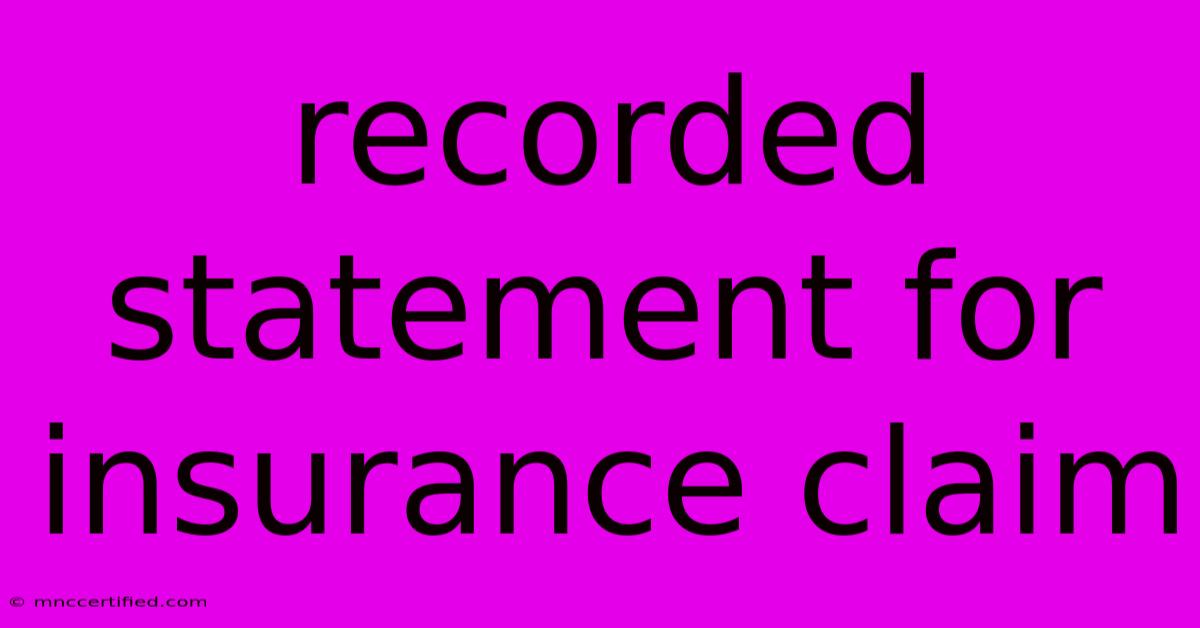Recorded Statement For Insurance Claim

Table of Contents
Recorded Statements: Your Key to a Smooth Insurance Claim
When you experience an unexpected event like a car accident or a house fire, filing an insurance claim is a crucial step. But what if you're unsure about the process? One critical element in the claim process is the recorded statement. This article will delve into the importance of recorded statements, explain what they are, and guide you through the process to ensure you understand your rights and responsibilities.
What is a Recorded Statement?
A recorded statement is a formal interview conducted by an insurance adjuster, usually after you've filed a claim. It's a detailed account of the incident from your perspective, captured on audio or video. The purpose of this statement is to document your version of events, provide crucial details, and potentially strengthen your claim.
Why are Recorded Statements Important?
For You:
- Accurate Documentation: Your recorded statement serves as a permanent, objective record of your version of events. This can be particularly valuable if there are discrepancies with other accounts or if memories fade over time.
- Clarity and Consistency: By clearly articulating your account, you reduce the risk of inconsistencies or contradictions in your story later on.
- Supporting Evidence: Your statement becomes part of the claim file, supporting your request for coverage and potentially influencing the outcome of your claim.
For the Insurance Company:
- Fair Assessment: The recorded statement helps the insurance company gather information to assess the validity of your claim and determine the extent of coverage.
- Understanding the Incident: The statement provides context and insights into the incident, aiding in the investigation process.
- Preventing Fraud: Recorded statements help deter fraud by documenting your account and identifying any inconsistencies or discrepancies.
Preparing for Your Recorded Statement
- Review your policy: Before the statement, understand your coverage, the incident details you need to provide, and the limits of your policy.
- Gather information: Collect any relevant documents or evidence, such as police reports, medical records, or photos of the damage.
- Practice your account: Rehearse your story beforehand to ensure clarity and coherence.
- Know your rights: Understand your rights regarding the recording process and your ability to request clarification or corrections.
Tips for a Successful Recorded Statement
- Be Honest and Accurate: Provide truthful and complete information. Don't exaggerate or withhold details.
- Stay Calm and Composed: Speak clearly and calmly, even if you are stressed or upset.
- Focus on Facts: Stick to what you know, avoid speculation or assumptions.
- Use Clear and Concise Language: Use simple language to avoid confusion.
- Don't Hesitate to Ask Questions: If you don't understand something, ask for clarification.
- Review and Correct: If possible, review the recording with the adjuster before signing off.
What to do if You Disagree with the Adjuster
- Express your disagreement: Calmly explain your perspective and any concerns you have.
- Document everything: Keep detailed notes about the conversation, any disagreements, and the adjuster's responses.
- Consult your insurance agent: If you are dissatisfied with the adjuster's handling of the claim, contact your insurance agent for assistance.
- Seek Legal Counsel: If you feel the insurance company is not treating you fairly, consider contacting a lawyer who specializes in insurance claims.
Final Thoughts
A recorded statement is a crucial part of the insurance claim process. By understanding its importance, preparing adequately, and communicating effectively, you can ensure your statement accurately reflects the incident and enhances your chances of a successful claim resolution. Remember, honesty, clarity, and thoroughness are key to maximizing your chances of a fair outcome.

Thank you for visiting our website wich cover about Recorded Statement For Insurance Claim. We hope the information provided has been useful to you. Feel free to contact us if you have any questions or need further assistance. See you next time and dont miss to bookmark.
Featured Posts
-
Lower Bucks Insurance Group Jobs Remote
Nov 09, 2024
-
Is Ohio A No Fault Car Insurance State
Nov 09, 2024
-
Betting Tips Cardiff Vs Blackburn Match Preview
Nov 09, 2024
-
Land Rover Defender James Bond Spectre
Nov 09, 2024
-
Lord Mayors Show Londons Grand Tradition
Nov 09, 2024